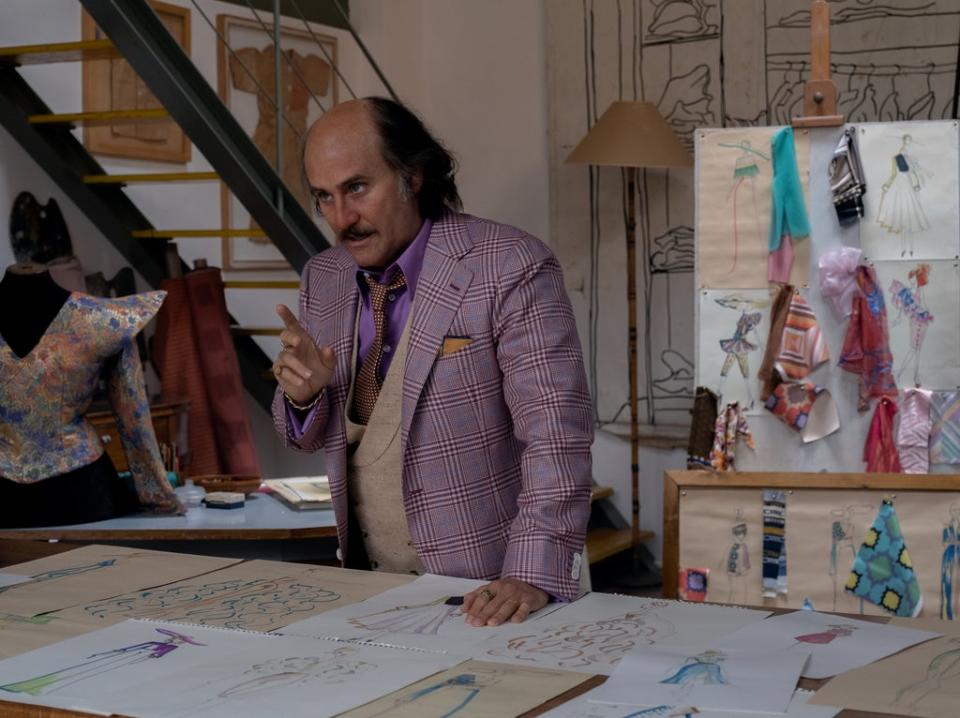House of Gucci review: Proof that tackiness can be art, and ostentation can be chic

Dir: Ridley Scott. Starring: Lady Gaga, Adam Driver, Jared Leto, Jeremy Irons, Salma Hayek, Al Pacino. 15, 157 minutes.
House of Gucci is a titillating, ridiculous and utterly engrossing soap opera. It’s also the only appropriate movie to be made about a fashion brand built primarily for wealthy maximalists. Tacky, sure, but Gucci itself is proof that tackiness can be art, and ostentation can be chic. Just a few weeks ago, Macaulay Culkin walked the brand’s spring/summer 2022 show in clashing prints that seemed to directly homage Ace Ventura: Pet Detective. Ridley Scott’s film, in turn, deliberately moulds itself around its star, Lady Gaga – a woman canny and self-aware enough to have once successfully stapled slabs of raw meat to her body and sold it as an haute couture moment.
She plays Patrizia Reggiani, the real-life daughter of a trucking magnate who married into the Gucci clan after meeting one of its heirs: the sober-minded Maurizio (Adam Driver). Scott’s film is quick to bury its claws into the family’s strife. Maurizio’s father Rodolfo (Jeremy Irons) dismisses Patrizia as a social climber, there are clashes with Rodolfo’s brother Aldo (Al Pacino), as well as Aldo’s son, a “triumph of mediocrity” by the name of Paolo (Jared Leto, whose highly publicised “transformation” makes him look like an Italian Dr Phil). Somewhere along the way, Maurizio’s relationship with Patrizia disintegrates. They divorce, she’s humiliated. And, in 1995, Maurizio dies at the hand of a hitman hired by Patrizia with Gucci money.
Gaga plays the film’s early scenes with a winking, playful innocence, consciously mirroring Patrizia’s story with that of Ally, her character in 2018’s A Star is Born – another ordinary woman plucked from relative obscurity. Driver, in exacting contrast to his co-star, hasn’t looked this gawky in a while, despite all the finery. But when the two of them have sex in a grimy bungalow office, they immediately snap back into movie star mode, delivering an Oscar-worthy duologue of thrusting and grunting. What makes Gaga feel so unmatched in her onscreen bravura – and Patrizia’s feigned humility dissipates the moment she touches a fur coat – has nothing to do with the narrative put forward in her recent press tour for the film. It’s not the nine months she spent in character, or whether her painstakingly researched accent sounds accurate (it doesn’t). It’s her ability to empower even the smallest of acting choices with operatic symbolism.
There’s a defiance with which Patrizia turns up her chin when she’s threatened. When she rests her foot on the dashboard of a car, it becomes an act of provocative seduction. And when she taps her espresso cup with her spoon, you can feel the menace of it like a slap to the face. Those singular images are all shrewdly accentuated by Janty Yates’s costume design. Patrizia starts off the film demurely batting her eyelids in trenchcoats, polka dot dresses, and headscarves. But over time, her hair starts to puff up in angry, gelled spikes, so that she leaves the film looking a little like Sonic the Hedgehog – the pair of them already alike in their mutual fixation on gold rings.
Unlike Scott’s previous directorial effort, The Last Duel – which was released only a month ago – House of Gucci feels less directly concerned with achieving contemporary relevance. It’s a more straightforward story of beautiful things corrupted by ugly desires. There’s a knowing quality to the way Gucci’s flagship store in Rome is described as the “Vatican of fashion”, as if its gilded exterior could hide all sorts of sins within. What screenwriters Becky Johnston and Roberto Bentivegna, working off Sara Gay Forden’s 2000 book on the scandal, offer is an unexpected nostalgia for a period in late-stage capitalism where familial empires still held power against the boardrooms and conglomerates. It’s the idea that, at the top of the ladder, there at least stood someone with a drop of pride and dignity left. You can imagine Scott would have much the same to say about Hollywood.

House of Gucci does, indeed, harken back to the star-driven vehicles of a pre-franchise era, which is why the cast feel so entitled to their indulgences: Irons, at leisure, swallowed up in a pashmina; Salma Hayek, as Patrizia’s closest friend, planning a murder while neck-deep in a mud bath; Leto, clearly in heaven, as he schlepps around in his fat suit and a bald cap so tight you can see it pulling at his skin. He fancies himself the real star of the show. Luxuriating in the rolled “r”’s of his appropriated Mario voice, he delivers lines like “I can finally soar, like a pigeon”, and “Never confuse s*** with chocolate”. Is what he’s doing tacky? Yes. Is it exactly what House of Gucci needed? Absolutely.
Read More
House of Gucci: The true story behind Ridley Scott film starring Lady Gaga and Adam Driver
Ridley Scott: ‘Cinemas should not be allowed to go away’
Cormac, car sex and Cameron Diaz: Is The Counsellor Ridley Scott’s secret masterpiece?

 Yahoo News
Yahoo News 